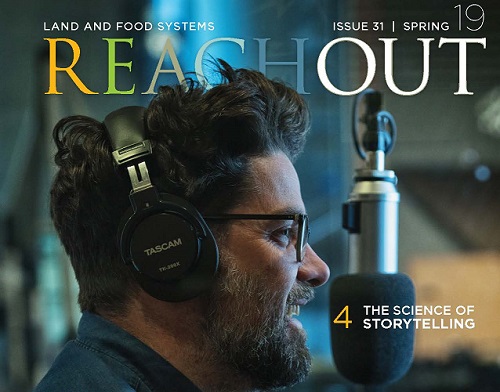
Learning Tools for Just Food
Joyce Liao and Meryn Corkery worked on a community project in LFS 350 (Land, Food, and Community II) involving equity issues in the food system and both felt a strong desire to dig deeper. So together with PhD candidate Colin Dring, they proposed an ambitious project to build tools that everyone from a first-year student to a seasoned faculty member could use to give students the skills to enact change in the food system.
“We initiated it because I was feeling like there was a lack of teaching about social and cultural sustainability,” says Liao, a fourth-year Global Resource Systems (GRS) student. “There was a deep desire in us to see this embedded more in all courses in LFS.”
Their two-year project Just Food: Building Equity Competencies with Food Systems Pedagogy was funded by UBC’s Teaching and Learning Enhancement Fund.
The project involves people from across UBC campus. Other members lend their expertise from the Centre for Sustainable Food Systems at UBC Farm; Faculty of Arts; Department of Educational Studies; and the Centre for Teaching, Learning Technology. The project leads are Corkery and Liao, with support from Dring and LFS faculty member Will Valley.
The team has started a scan of UBC courses that use food and equity as a means to engage teaching and learning, and began reviewing 16 institutions externally.
Both Liao and Corkery, also a fourth-year GRS student, believe the topic of equity in the food system should be introduced earlier in the undergraduate curriculum to recognize how intersectionality is a lens for exploring the different ways people shape and are shaped by the food system. People of different race, gender, and class experience a different level of access to food. For example, First Nations people who live on reserves, and single parents who are female are more likely to report experiencing food insecurity in Canada.
Dring, who is working on his PhD in Agricultural Planning, said this project enables undergraduate students to meet their desire to give back and further the conversation. It also builds a foundation to prepare students as global citizens and future professionals or academics who can work on these important issues.
“An essential part of post-secondary education in sustainable agriculture requires an understanding of the social relations related to food and equity,” Dring said. “To be global citizens working towards social justice requires skills such as active listening, communication, emotional awareness and management, and knowledge of decolonization, anti-oppression, and food justice.”
Dring is also Chair of the BC Food Systems Network, Secretary of the Sustainable Agricultural Education Association, and sits on the Food Justice Working Group of the Vancouver Food Policy Council.
In the end, the project team hopes to build a collection of online multimedia and open source materials available to those within and external to UBC, as well as teach-back tools that could be used by both students and faculty members.
“We both realized we wanted to employ different ways of learning that were more purposeful and more in-depth,” said Corkery. They plan to pilot some of the tools in the fall in a student-directed seminar, then begin to implement them into LFS courses early 2020.
